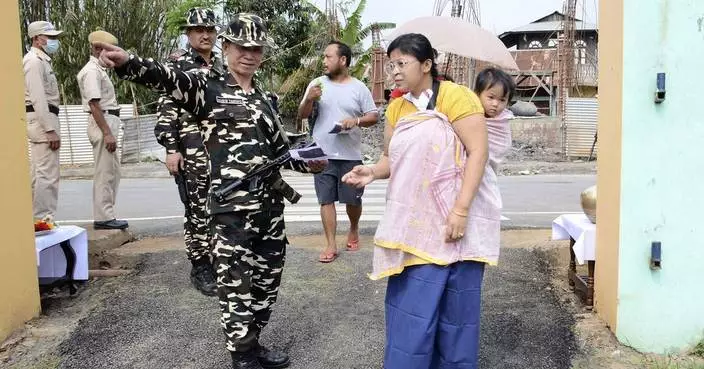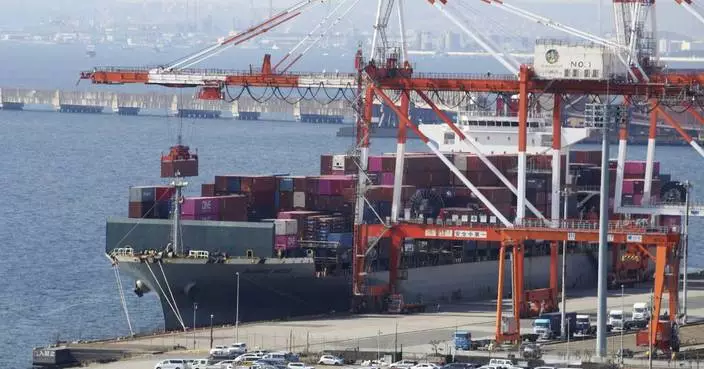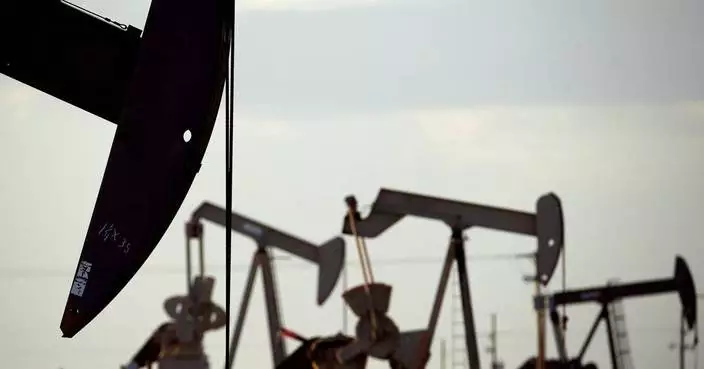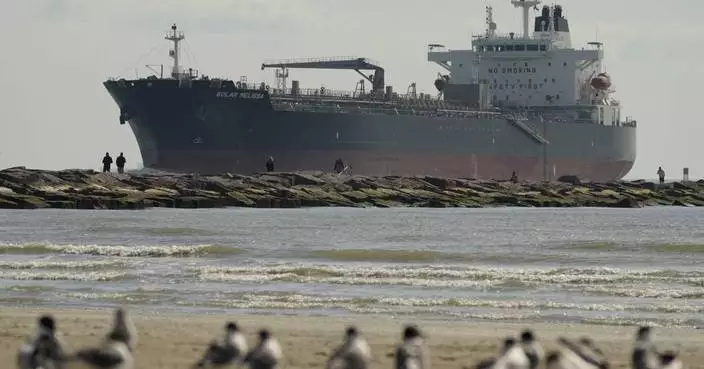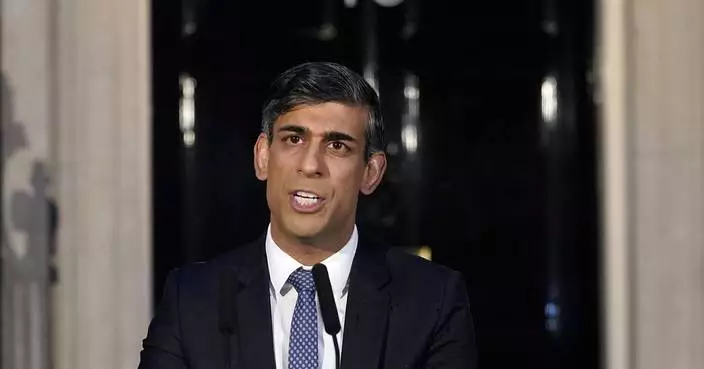China's imports from North Korea plunged 92.6 percent in June compared with a year earlier under U.N. sanctions imposed to stop Pyongyang's nuclear and missile programs, the customs agency said Friday.
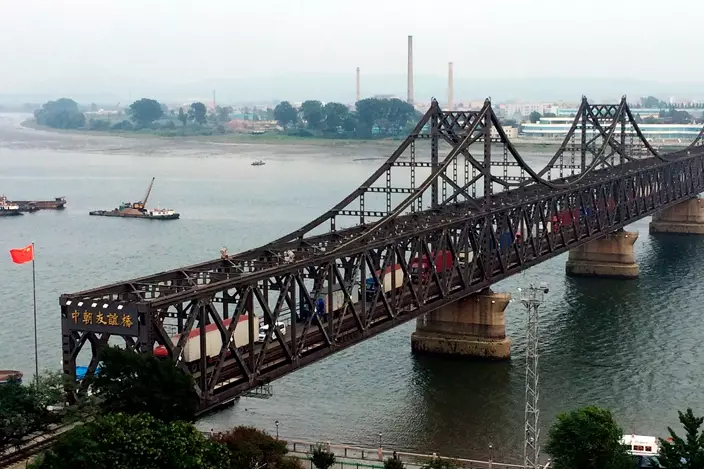
In this Sept. 4, 2017, file photo, trucks cross the friendship bridge connecting China and North Korea in the Chinese border town of Dandong, opposite side of the North Korean town of Sinuiju. (AP Photo/Helene Franchineau, File)
Exports of Chinese oil and other goods to the North fell 40.6 percent, a customs agency spokesman, Huang Songping, said at a news conference. He gave no financial totals.
The trade curbs have remained in place despite diplomatic contacts including U.S. President Donald Trump's June meeting with North Korean leader Kim Jong Un.
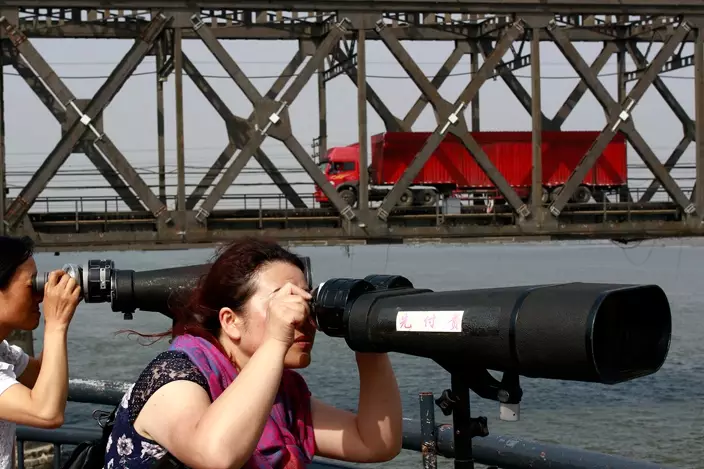
In this May 24, 2018, photo, tourists peek through the telescopes into North Korea as a truck crosses the friendship bridge connecting China and North Korea in the Chinese border town of Dandong, opposite side of the North Korean town of Sinuiju. (Chinatopix Via AP)
American Secretary of State Mike Pompeo, who visited Pyongyang this month, said sanctions wouldn't be lifted until Kim follows through on his pledge to scrap its nuclear weapons.
China provides nearly all of the isolated North's trade and energy supplies. Beijing has imposed limits on oil exports and sharply reduced North Korean revenue by banning purchases of its textiles, seafood and coal.
Beijing was long Pyongyang's diplomatic protector but has supported the U.N. sanctions out of frustration at what Chinese leaders see as their neighbor's increasingly reckless behavior.
Beijing also ordered North Korean-owned restaurants and other businesses in China, an important revenue source, to close.
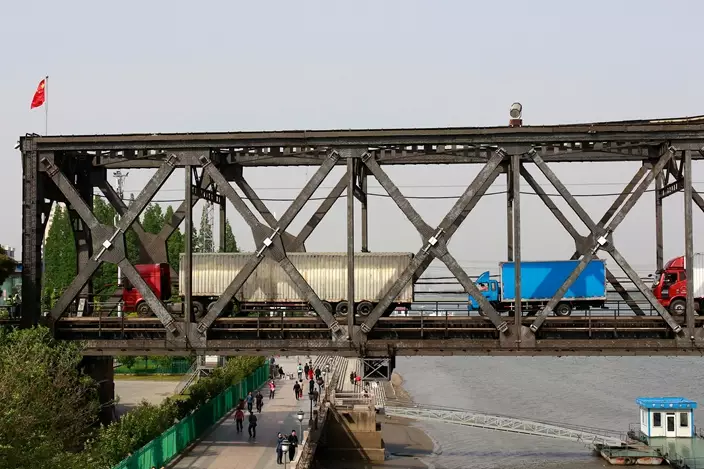
In this May 24, 2018, photo, trucks cross the friendship bridge connecting China and North Korea in the Chinese border town of Dandong, opposite side of the North Korean town of Sinuiju. (Chinatopix Via AP)
In the first six months of the year, Chinese imports fell 88.7 percent from the same period of 2017 to 690 million yuan ($103 million), according to Huang. Exports declined 43.1 percent to 6.4 billion yuan ($960 million).
Huang said Chinese exports to the North have declined for 11 straight months, while imports have declined for 10 months.
Beijing has "consistently implemented" the U.N. trade curbs, Huang said.
Also Friday, a deputy Chinese foreign minister sounded a reassuring note about North Korea after Trump complained Beijing might be disrupting diplomatic efforts due to its trade dispute with Washington.
The official, Kong Xuanyou, said there has been "positive momentum" and Beijing is in "close coordination" with Washington.
"We will stay in touch with the United States through various channels in a joint effort to uphold peace and stability on the peninsula to facilitate the political settlement of the Korean issue," Kong said.
If the governments involved "candid discussions as equals," then "all the questions will find the right answers," he said.
BAGHDAD (AP) — Turkish President Recep Tayyip Erdog an arrived in Iraq on Monday for his first official visit in more than a decade as Ankara seeks greater cooperation from Baghdad in its fight against a Kurdish militant group that has a foothold in Iraq.
Other issues also loom large between the two countries, including water supply and exports of oil and gas from northern Iraq to Turkey, halted for more than a year.
Erdogan, whose last visit to Baghdad was in 2011, when he was prime minister, met with Iraqi President Abdul Latif Rashid and Prime Minister Mohammed Shia al-Sudani as they inked agreements on water management, security, energy and economic cooperation.
“I believe that my visit and the agreements just signed will constitute a new turning point in Turkey-Iraq relations,” Erdogan said in a joint news conference with al-Sudani.
Al-Sudani said they discussed “bilateral security coordination, which will meet the needs of both parties and confront the challenges posed by the presence of armed elements that may cooperate with terrorism and violate the security of the two countries.”
Erdogan's visit “comes at a sensitive and dangerous time," al-Sudani added, citing Israel's war against the Hamas militant group in Gaza — a war that has had ripple effects across the region.
Erdogan said the leaders had “consulted on the joint steps we can take against the PKK terrorist organization and its extensions, which target Turkey from Iraqi territory," referring to the Kurdistan Workers’ Party, or PKK, a Kurdish separatist movement banned in Turkey.
The PKK has maintained bases in northern Iraq's semiautonomous Kurdish region.
Erdogan had previously announced a major operation against the PKK during the summer, with the aim of “permanently” eradicating the threat it poses. He did not specify what actions Turkish forces would take in Iraq but Turkish forces have in the past carried out numerous ground offensives against PKK in northern Iraq and Turkish jets frequently target suspected PKK sites.
Ankara now aims to create a 30-40 kilometer (19-25 mile) deep security corridor along the joint border with Iraq, Turkish Defense Minister Yasar Guler told journalists last month.
The insurgency — the PKK is fighting for an autonomous Kurdish state in southeast Turkey — has claimed tens of thousands of lives since the 1980s and Turkey and its Western allies have labelled PKK a terrorist organization.
Baghdad has long complained that Turkish actions in Iraq against the PKK violate its sovereignty, but appears to be acquiescing with Ankara’s operations.
In March, after a meeting between the Iraqi and Turkish foreign ministers, Baghdad announced that the Iraqi National Security Council had issued a ban on the PKK, although it stopped short of designating it as a terrorist organization. Erdogan on Monday praised the ban.
Al-Sudani told journalists during a visit to Washington last week that Iraq and Turkey have “true interests with one another and common projects.” He noted that the PKK has long had a presence in northern Iraq, “but we are not allowing any armed group to be on Iraqi territory and using it as a launchpad for attacks.”
Ankara has argued that PKK's presence in Iraq threatens the planned construction of a major trade route, the Iraq Development Road, that would connect the port in Basra, southern Iraq, to Turkey and Europe through a network of rail lines and highways.
Baghdad may take a similar approach to the PKK as it has taken to Iranian Kurdish dissident groups based in northern Iraq.
The presence of Iranian dissidents had become a point of tension with Tehran, which periodically launches airstrikes on their bases in Iraq. Last summer, Iran and Iraq reached an agreement to disarm the groups and relocate their members from military bases to displacement camps.
Energy issues and water rights are also key in Iraq-Turkey ties.
An oil pipeline running from the semiautonomous Kurdish region to Turkey has been shut down since March 2023, after an arbitration court ruling ordered Ankara to pay Iraq $1.5 billion for oil exports that bypassed Iraq's central government in Baghdad. The sharing of oil and gas revenues has long been a contentious issue between Baghdad and Kurdish authorities in Irbil.
In recent years, Iraqi officials have complained that dams built by Turkey are reducing Iraq’s water supply.
The Tigris and Euphrates rivers, which provide most of Iraq’s fresh water, originate in Turkey. Experts fear that climate change is likely to exacerbate existing water shortages in Iraq, with potentially devastating consequences.
Mustafa Hassan, a Baghdad resident, said he hopes that Erdogan’s visit “will help to solve problems related to water, because Iraq is suffering from a water scarcity crisis, and this affects agriculture.”
Erdogan said Ankara was aware of the water problems Iraq faces and that the two countries have set up "a joint permanent committee which is going to help through cooperation ... taking our shared interests into consideration.”
Fraser reported from Istanbul. Associated Press writers Andrew Wilks in Istanbul, Ellen Knickmeyer in Washington and Ali Jabar in Baghdad contributed to this report.

FILE - Turkey's President Recep Tayyip Erdogan, right, and Iraq's Prime Minister Mohammed Shia al-Sudani speak to the media after their talks, in Ankara, Turkey, Tuesday, March 21, 2023. Erdogan was set to make his first official visit to Iraq in more than a decade on Monday April 22, 2024 as his country seeks greater cooperation from Baghdad in its fight against a Kurdish militant group that has a foothold in northern Iraq. (AP Photo/Burhan Ozbilici, File)
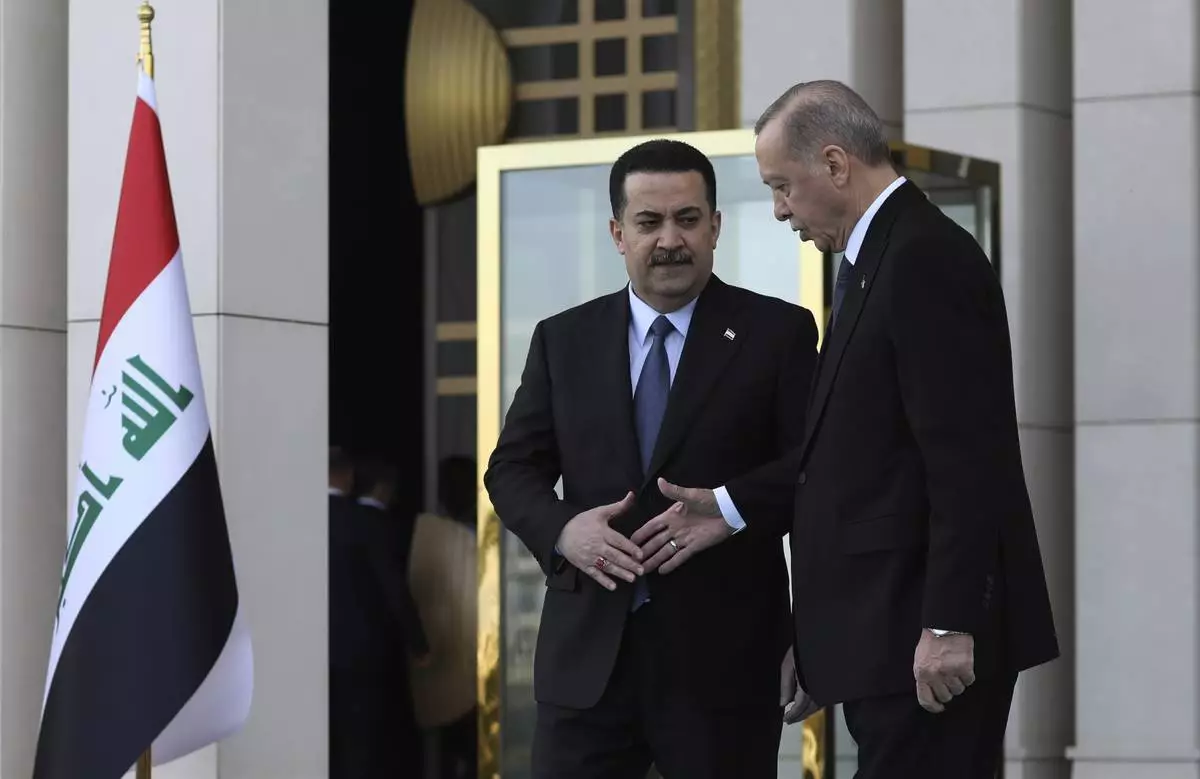
FILE - Turkey's President Recep Tayyip Erdogan, right, and Iraq's Prime Minister Mohammed Shia al-Sudani shake hands during a welcome ceremony in Ankara, Turkey, Tuesday, March 21, 2023. Erdogan was set to make his first official visit to Iraq in more than a decade on Monday April 22, 2024 as his country seeks greater cooperation from Baghdad in its fight against a Kurdish militant group that has a foothold in northern Iraq. (AP Photo/Burhan Ozbilici, File)








